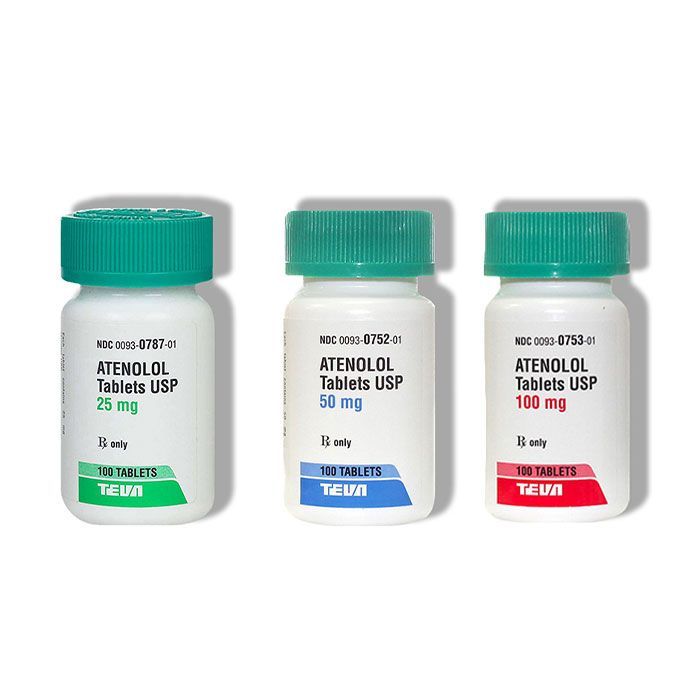Atenolol - Generic Tenormin
Heart Health
Atenolol, a potent beta blocker, is employed either independently or in conjunction with other medications for the management of cardiovascular conditions like high blood pressure and angina prevention. Renowned for its ability to relax blood vessels and reduce heart rate, Atenolol is instrumental in enhancing survival rates post-heart attack. Ensure your health is prioritized and enjoy a 5% savings with convenient auto-refills. Never face the risk of running out of your essential medication with our reliable service!
Before taking Atenolol:
- Tell your doctor and pharmacist if you are allergic to atenolol, any other medications, or any of the ingredients in atenolol tablets. Ask your pharmacist for a list of the ingredients.
- Tell your doctor and pharmacist what prescription and nonprescription medications, vitamins, nutritional supplements, and herbal products you are taking. Be sure to mention any of the following: calcium channel blockers such as diltiazem (Cardizem, Cartia XT, Dilacor XR, Tiazac, others) and verapamil (Calan, Covera-HS, Verelan, in Tarka); clonidine (Catapres, Kapvay, in Clorpres); nonsteroidal anti-inflammatory drugs (NSAIDs) such as indomethacin (Indocin, Tivorbex); and reserpine. Your doctor may need to change the doses of your medications or monitor you carefully for side effects.
- Tell your doctor if you have or have ever had asthma or other lung diseases; diabetes; severe allergies; hyperthyroidism (an overactive thyroid gland); pheochromocytoma (a tumor that develops on a gland near the kidneys and may cause high blood pressure and fast heartbeat); heart failure; a slow heart rate; circulation problems; or heart or kidney disease.
- Tell your doctor if you are pregnant, plan to become pregnant, or are breast-feeding. If you become pregnant while taking atenolol, call your doctor immediately.
- Tell the doctor or dentist that you are taking atenolol if you are having surgery, including dental surgery.
- If your doctor prescribes a low-salt or low-sodium diet, follow those directions carefully.
What should I do if I forget a dose?
If you miss a dose, take the missed dose as soon as you remember it. However, if it is almost time for the next dose, skip the missed dose and continue your regular dosing schedule. Do not take a double dose to make up for a missed one.
Atenolol may cause side effects. Tell your doctor if any of these symptoms are severe or do not go away:
- Dizziness
- Lightheadedness
- Tiredness
- Drowsiness
- Depression
- Nausea
- Diarrhea
Some side effects can be serious. The following symptoms are uncommon, but if you experience any of them, call your doctor immediately:
- Shortness of breath
- Swelling of the hands, feet, ankles, or lower legs
- Weight gain
- Fainting
Atenolol may cause other side effects. Call your doctor if you have any unusual problems while taking this medication.
If you experience a serious side effect, you or your doctor may send a report to the Food and Drug Administration's (FDA) MedWatch Adverse Event Reporting program online http://www.fda.gov/Safety/MedWatch or by phone (1-800-332-1088).
Keep this medication in the container it came in, tightly closed, and out of reach of children. Store it at room temperature and away from excess heat and moisture (not in the bathroom).
It is important to keep all medication out of sight and reach of children as many containers (such as weekly pill minders and those for eye drops, creams, patches, and inhalers) are not child-resistant and young children can open them easily. To protect young children from poisoning, always lock safety caps and immediately place the medication in a safe location – one that is up and away and out of their sight and reach. For more information, visit http://www.upandaway.org.
Unneeded medications should be disposed of in special ways to ensure that pets, children, and other people cannot consume them. However, you should not flush this medication down the toilet. Instead, the best way to dispose of your medication is through a medicine take-back program. Talk to your pharmacist or contact your local garbage/recycling department to learn about take-back programs in your community. See the FDA's Safe Disposal of Medicines website http://goo.gl/c4Rm4p for more information if you do not have access to a take-back program.
Symptoms of overdose may include:
- Lack of energy
- Difficulty breathing
- Wheezing
- Slow heartbeat
- Fainting
- Swelling of the hands, feet, ankles, or lower legs
- Unusual weight gain
- Shakiness
- Dizziness
- Rapid heartbeat
- Sweating or confusion
- Blurred vision
- Headache
- Numbness or tingling of the mouth
- Weakness
- Excessive tiredness
- Pale color
- Sudden hunger
In case of overdose, call the poison control helpline at 1-800-222-1222. Information is also available online https://www.poisonhelp.org. If the victim has collapsed, had a seizure, has trouble breathing, or can't be awakened, immediately call emergency services at 911.

